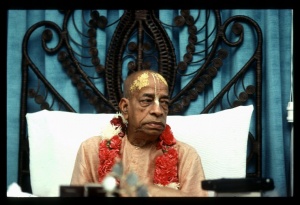BG 17.15 (1972)

A.C. Bhaktivedanta Swami Prabhupada
TEXT 15
- अनुद्वेगकरं वाक्यं सत्यं प्रियहितं च यत् ।
- स्वाध्यायाभ्यसनं चैव वाङ्मयं तप उच्यते ॥१५॥
- anudvega-karaṁ vākyaṁ
- satyaṁ priya-hitaṁ ca yat
- svādhyāyābhyasanaṁ caiva
- vāṅ-mayaṁ tapa ucyate
SYNONYMS
anudvega—not agitating; karam—producing; vākyam—words; satyam—truthful; priya—dear; hitam—beneficial; ca—also; yat—which; svādhyāya—Vedic study; abhyasanam—practice; ca—also; eva—certainly; vāṅmayaṁ—of the voice; tapaḥ—austerity; ucyate—is said to be.
TRANSLATION
Austerity of speech consists in speaking truthfully and beneficially and in avoiding speech that offends. One should also recite the Vedas regularly.
PURPORT
One should not speak in such a way as to agitate the minds of others. Of course, when a teacher speaks, he can speak the truth for the instruction of his students, but such a teacher should not speak to others who are not his students if he will agitate their minds. This is penance as far as talking is concerned. Besides that, one should not talk nonsense. When speaking in spiritual circles, one's statements must be upheld by the scriptures. One should at once quote from scriptural authority to back up what he is saying. At the same time, such talk should be very pleasurable to the ear. By such discussions, one may derive the highest benefit and elevate human society. There is a limitless stock of Vedic literature, and one should study this. This is called penance of speech.